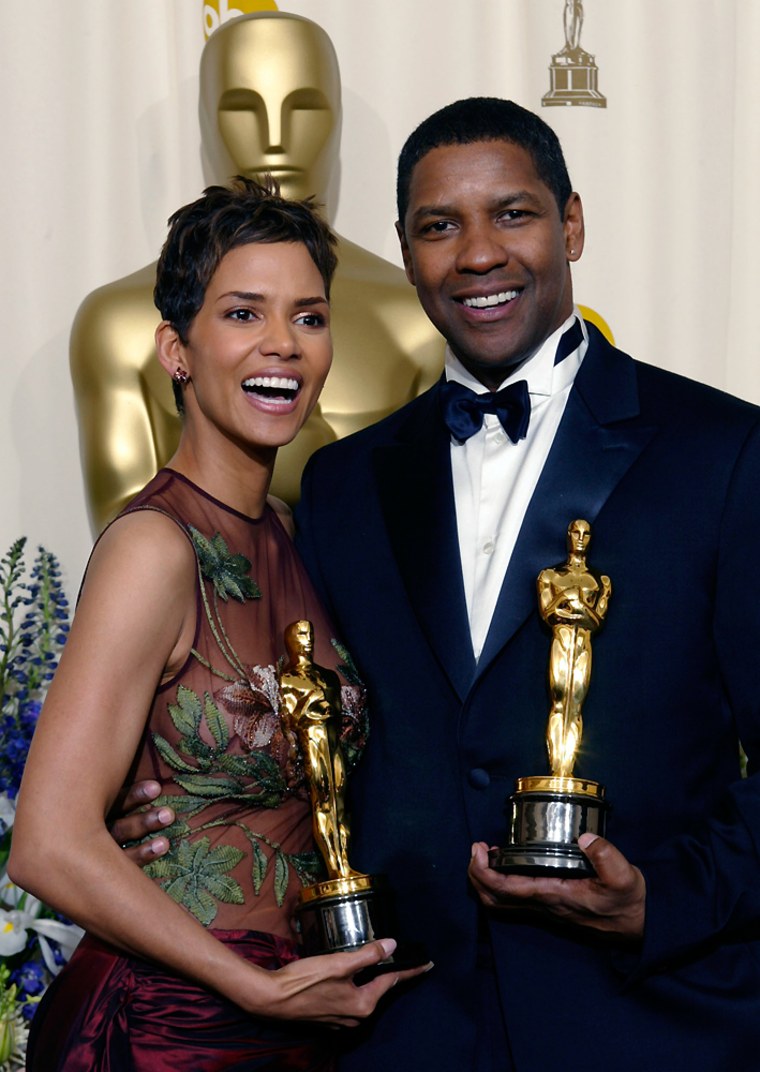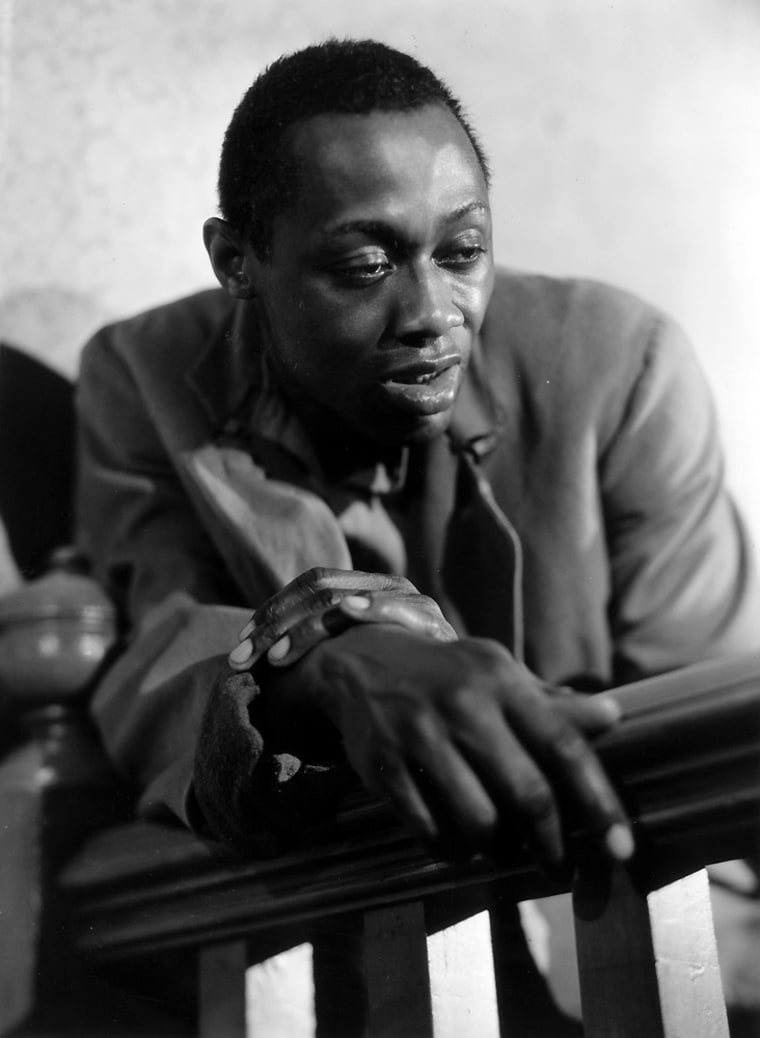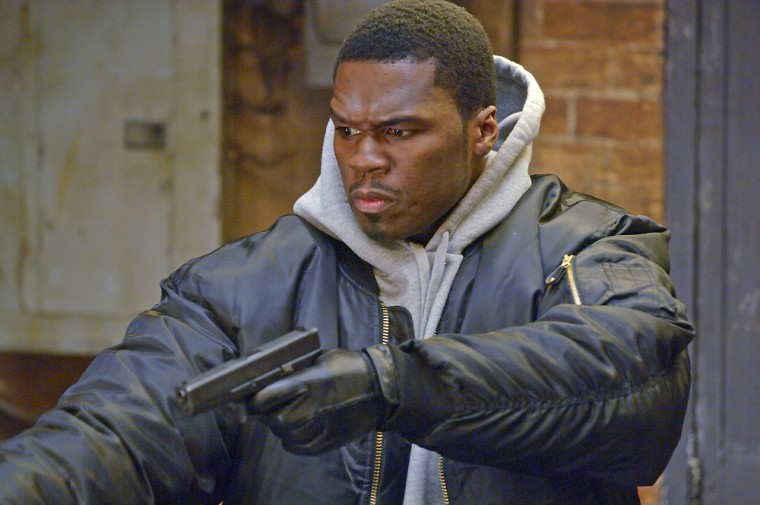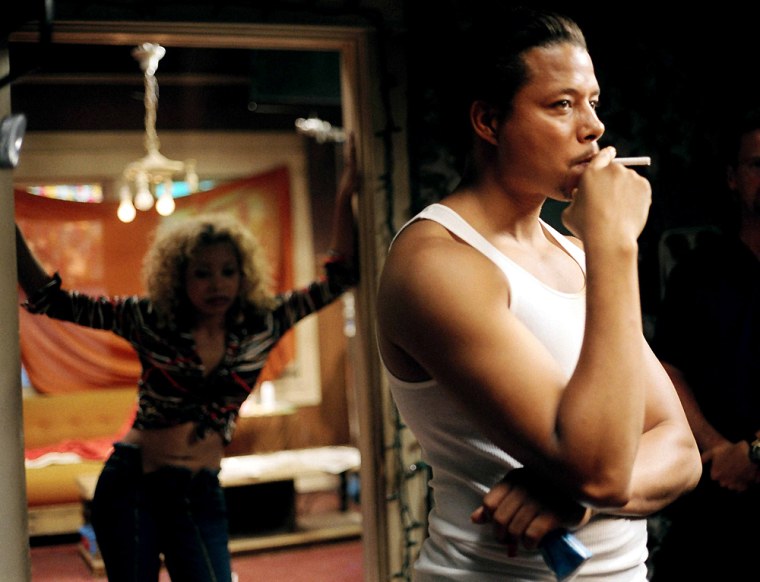Flashback to 2002: Hollywood was ecstatic. The mainstream media proclaimed, “History has been made!”
Denzel Washington was named best actor for “Training Day,” and Halle Berry won best actress for “Monster's Ball.” The Academy Awards were hosted by Whoopi Goldberg and featured an honorary statue for Sidney Poitier. It was a proud moment for Hollywood, and African-American actors and actresses.
Typical conversation heard in the black community after: You do realize the award for Denzel was a make-up, don't you? He should have won for “Malcolm X.” And Halle Berry? She had that wild sex scene with a white man, didn't she? Uh-huh. And didn’t they kill P. Diddy in that movie?
Flashback to 2005: Hollywood was once again ecstatic. Mainstream media once again proclaimed “Academy Award history.” Jamie Foxx won best actor for his extraordinary emulation of Ray Charles in the biopic “Ray.” He was also nominated for best supporting actor for “Collateral,” while Morgan Freeman won the award for “Million Dollar Baby.”
Accepting his award, Freeman said, “It means that Hollywood is continuing to make history. We’re evolving with the rest of the world.”

2005 was the best year ever for black actors and actresses, earning a record five of 20 acting nominations, including the two for Foxx. Don Cheadle was nominated for best actor and Sophie Okonedo as best supporting actress for “Hotel Rwanda.”
Typical conversation heard in the black community after: Foxx was best actor? Well he should have won, they couldn't deny him that role. It would be like denying that Michael Jordan was the best. And you said Morgan Freeman won, too! For what? “Million Dollar Baby.” Didn't see it. But that's good, I guess. Isn't he that dude who played in “Driving Miss Daisy”? I didn't see that one either, but didn't that movie win best picture over Spike's “Do the Right Thing.” Uh-huh. Enough said.
Present day: Same as it ever was.
Terrence Howard is nominated for best actor for his role as a pimp in "Hustle and Flow." And black people are not surprised by Hollywood's glorification of negative images of black people. After all, we know the history of Tinseltown.
It started in 1915, with Hollywood’s first motion picture, “The Birth of a Nation,” D.W.Griffith’s racist film version of Thomas Dixon’s pro-South Ku Klux Klan novel “The Clansman.” The film is still the most anti-black movie ever produced. From there, Hollywood produced “blackface” movies, films in which white performers “blacked up” their faces with burnt cork, then did minstrel show songs and skits littered with racist and stereotypical mannerisms. Black historians have called this so-called “entertainment” the only one that was born out of blind bigotry.
Race movies
In 1929, Hollywood gave us “Hearts in Dixie,” introducing America to black actor Lincoln Theodore Monroe Andrew Perry, better known as Stepin Fetchit. His great talent was used by Hollywood to reinforce the stereotype of the lazy good-for-nothing black.
In 1939, “Gone With the Wind” stormed onto the giant screen. While “The Birth of a Nation” was openly anti-black, “Gone With the Wind” was clandestinely anti-black. Hattie McDaniel's Mammy, a woman who willingly accepts her role as a slave, led Hollywood to deem her the first black person to win an Academy Award. And America received a line that white people still repeat, “I don't know nothin’ ‘bout birthin’ no babies.” For many African Americans, this became Hollywood’s defining moment of what the industry thought of us.
From 1929-1939, the United States was rocked by two major events:
- The Great Depression
- The start of World War II
These events were accompanied by the parallel track of “race movies” produced by both blacks and Hollywood, apart from each other. The low-budget films produced by African Americans were aimed at black audiences and featured African-Americans playing “normal” roles, such as doctors and lawyers.

By contrast, Hollywood’s versions offered black actors only roles as maids, butlers, servants or comics.
In the ’40s and ’50s, when television lured the country away from motion pictures, Hollywood was forced to integrate in order to attract audiences. African-American actors were given scenes alongside white actors in roles that showed them dealing with racism and societal issues.
In 1963, we saw the first African-American win an Oscar for best actor when Sidney Poitier took home the statue for “Lilies of the Field.”
Just when roles for blacks seemed to be improving in Hollywood, then arrived the “blaxploitation” era of the ’70s. Though the movies were mostly produced by blacks and aimed at black audiences, some films showed African-Americans as pimps, prostitutes and drug dealers. Movies like “The Mack,” starring Max Julien, and “Super Fly,” starring Ron O'Neal, glorified the pimp and hustler lifestyle. The movies' soundtracks were cool, the actors' language was cool, the clothes they wore were cool and the way women loved them was cool. Sound familiar? Thirty years later, today's rappers are living the “blaxploitation” era all over again. Hollywood wants to capitalize.
Where are the quality roles?
There is no denying that in “Hustle and Flow,” Howard was riveting as the Memphis pimp trying to better himself by going from selling “hoes” by becoming a rapper and rapping about selling hoes. But a noble endeavor? I don't think so. The role conforms to the old stereotypical image. Where are the quality roles for black men and women? Howard gave a powerful, heartfelt performance as a conflicted television director in "Crash," too. Certainly worth of an Oscar recognition, but the industry chose to recognize his role as a pimp.
Why is Hollywood bringing back the pimp? Because the top-selling mainstream music features rappers glorifying pimping and hustling. Even the theme song for “Hustle and Flow” — “It's Hard Out Here for Pimp” — is a nominee for best original song. The song features great lyrics like: “Gotta couple hoes workin’ on the changes for me. But I gotta keep my game tight like Kobe on game night.”
Americans are buying rappers’ CDs, ring tones, shoes, DVDs, clothes, movies, video games, cologne and more. They are on commercials selling cars, one while playing golf with an ex-automobile mogul. Of top 100 grossing films, nine featured African Americans — five with rappers. One was a basketball movie. Three were action dramas. Five of them were comedies.

Apparently, doing a movie about a pimp wannabe rapper seems like just another obvious route to profit on black stereotypes. Who came up with this original idea? A white man: Craig Brewer. As Don King would say, "Only in America."
I say: Only in the 21st Century. The "raploitation" era features rappers profiting, America celebrating and the corporate world pocketing billions of dollars off the negative images of black men.
But Audrey T. McCluskey, director of Black Film Center and professor of African-American Studies at Indiana University, said in a recent interview with BlackAmericaWeb.com that black film fans should be asking more pointed questions rather than crying foul about the Academy Award nominations — like where are the quality roles for black actors and where is the presence of blacks behind the cameras?
I couldn't agree more. Let's put an end to “raploitation,” just the way we put an end to their evil siblings blackface and blaxploitation.
